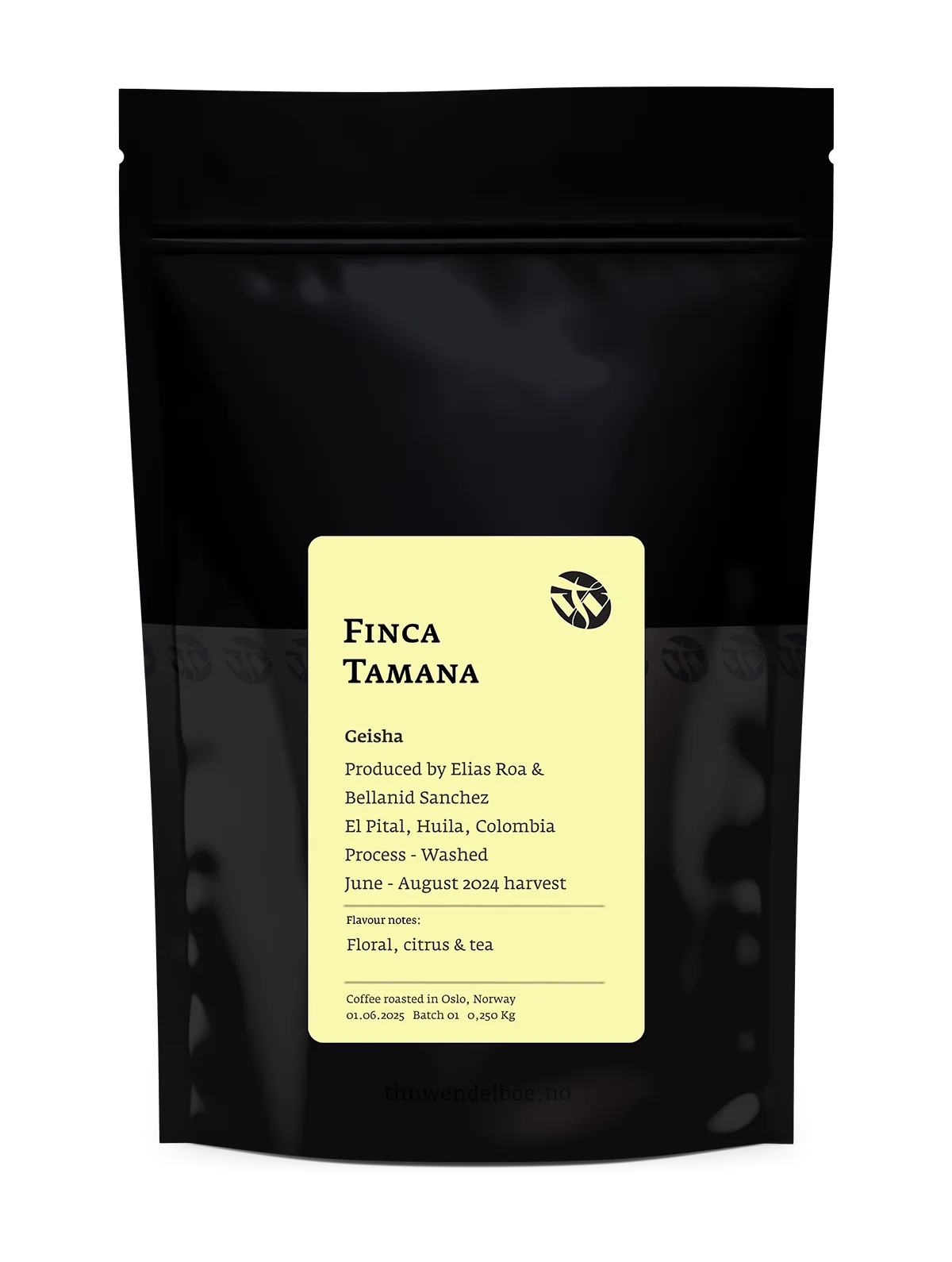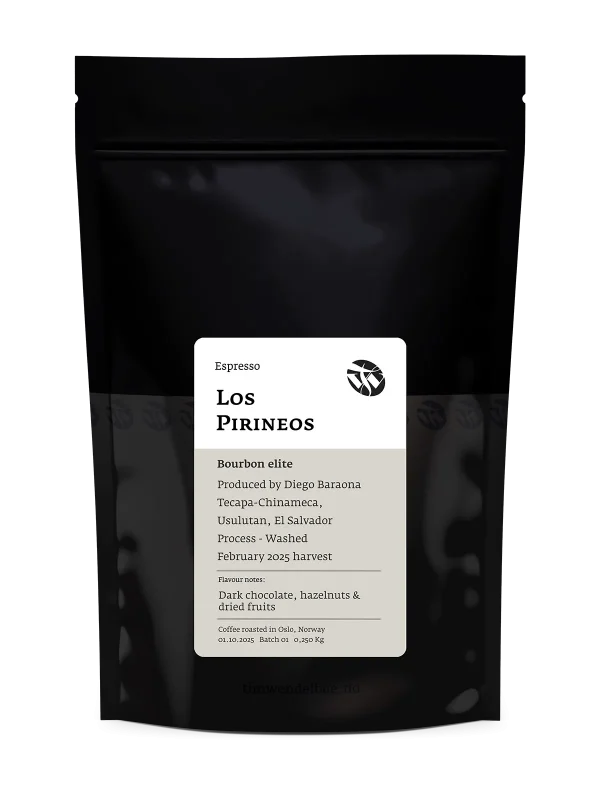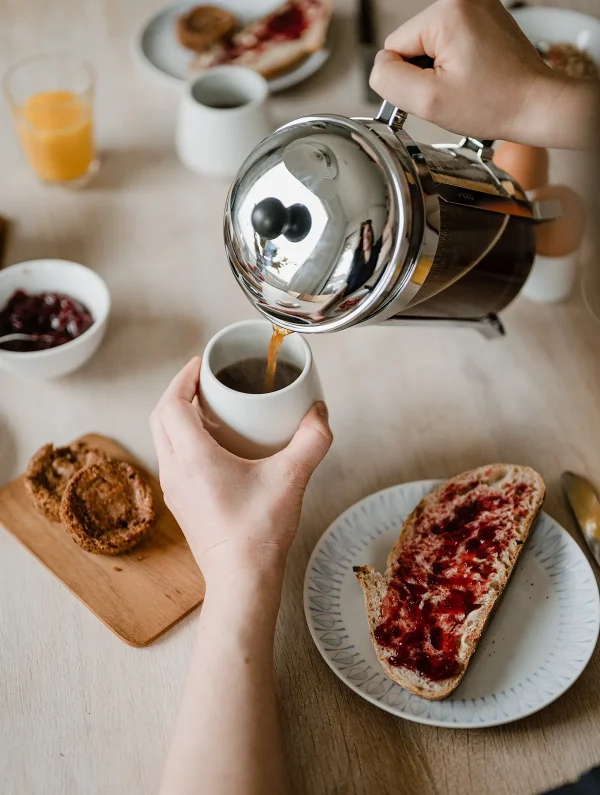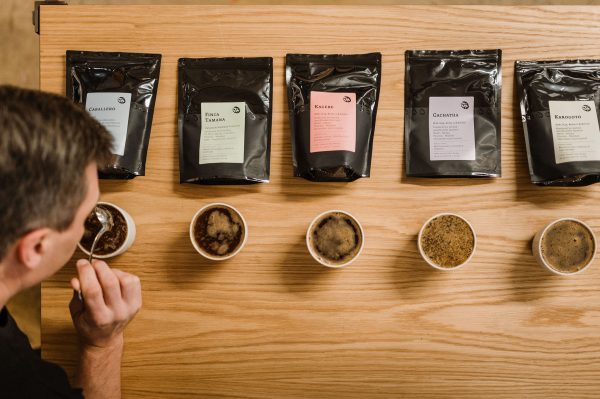| Cultivar | Geisha |
|---|---|
| Flavour Notes | Floral, citrus & tea |
| Producer | Elias Roa & Bellanid Sanchez |
| Country | Colombia |
| Region | El Pital, Huila |
| Process | Washed |
| Harvest | June – August 2024 |
| Roast Profile | Light Roast |
| Contents | Whole Coffee Beans |
| Bag Size | 250g |
Finca Tamana Geisha
kr239.00
A delicate Geisha coffee from Finca Tamana with subtle flavours of citrus, flowers and tea.
Out of stock
Additional information
Tim's Notes
The Geisha is another 'new' cultivar planted at Finca Tamana in recent years. Elias and Bellanid managed to get some good Geisha seeds from one of their neighbours and planted a few hectares of it at Finca Tamana some years ago. Unfortunately it seemed like the seeds they got was a mix of different cultivars as not all the trees looked like Geisha when they grew up which was reflected by an average flavour profile in the cup.
Because of this Elias and Bellanid started selecting seeds from the trees that looked like Geisha and that had coffee cherries with the familiar sweet papaya flavour that Geisha cherries normally have. They planted these seeds and after a year, when the seedlings were ready to be planted, they decided to replace a few hectares of Caturra with these new Geisha trees.
Today the trees have grown tall and grow partly under shade. The flavour of the coffee is more intense and much better than the first harvest from their first plantings of Geisha. Having said that, this is not a very intense Geisha and it is still far away from the most aromatic Geisha coffees you can buy from Panama or other areas in Colombia. But instead of focusing on what is not there I tend to appreciate the sweetness and the delicate floral and citrus flavours that this coffee has to offer.
Because of this Elias and Bellanid started selecting seeds from the trees that looked like Geisha and that had coffee cherries with the familiar sweet papaya flavour that Geisha cherries normally have. They planted these seeds and after a year, when the seedlings were ready to be planted, they decided to replace a few hectares of Caturra with these new Geisha trees.
Today the trees have grown tall and grow partly under shade. The flavour of the coffee is more intense and much better than the first harvest from their first plantings of Geisha. Having said that, this is not a very intense Geisha and it is still far away from the most aromatic Geisha coffees you can buy from Panama or other areas in Colombia. But instead of focusing on what is not there I tend to appreciate the sweetness and the delicate floral and citrus flavours that this coffee has to offer.
Cultivar
The Geisha cultivar is famous for its floral and citric cup profile. This Ethiopian cultivar was re-discovered by the famous Hacienda la Esmeralda in Panama in the early 2000's where it continues to break price records on online coffee auctions year after year.
Process
Picking and sorting
Depupling, fermenting & washing
Drying
- The coffee is selectively hand picked by hired pickers under supervision of Elias. Cherries are hand-sorted before they are processed to make sure only ripe cherries are processed together.
Depupling, fermenting & washing
- The coffee cherries are stored in the cherry hopper in open air over night before the coffee is de-pulped in the morning. After de-pulping, the parchment coffee with the mucilage on is fermented for 24 hours in clean stainless steel tanks. The fermentation is stopped when the mucilage is easy to clean off and before the coffee flavour is influenced by negative fermentation flavours. The coffee is then washed in clean water by using an eco-mill which is a mechanical mucilage remover. The eco-mill reduces water waste from the average 50-100 litres of water per kilo of coffee with traditional washing methods to only 0,5 – 1 litre per kilo. After washing the coffees are soaked for 24 hours in clean water in tiled cement tanks. All floaters (beans with low density) are removed during the washing and soaking process.
Drying
- After the soaking stage the clean parchment coffee is dried in parabolic dryers and drying beds covered with shade nets to prevent the beans from over heating. The coffees are raked throughout the day to ensure even drying. Drying normally takes from 20 to 30 days and once the moisture content is below 11% it gets packed and stored in air tight grain pro bags. All our coffees from Finca Tamana are vacuum packed before it is shipped to Norway.
Shipping
For our Norwegian customers, we offer three shipping options:
- Pakke i Postkassen - With Pakke i Postkassen, tracking is provided, and delivery is estimated within 2-3 business days.
- Pakke til hentested - The parcel can be collected from a Post in Store, Post Office, parcel locker, or parcel box. This option includes tracking, with delivery expected within 1-5 business days.
- Norwegian Post, No Tracking (Brevpost) - This option does not offer tracking. Delivery is estimated within 2-5 business days.
How To Brew
Filter
- We strongly recommend using the correct measurements and brewing techniques when you brew our coffees. Use a digital scale both to measure water and coffee in order to get consistent results, and we recommend using between 60 to 70 grams of coffee per litre (1000g) of water, depending on the brewing method, water quality and coffee used.
- We strongly recommend using VST filter baskets. Both the 18g, 20g and the 22g basket is great for our coffee. The VST filters makes it a lot easier to extract the espresso properly which gives a lot more sweetness in the cup. They are also more or less identical to each other which makes it easy to be more consistent when brewing on several groups at the same time. You can buy the filters on our webshop, just make sure they fit your machine (ours fits all La Marzocco machines and machines with 58mm filter baskets). With the VST 18g filter basket, we recommend the following brewing parameters: 18-19g freshly-ground coffee, 25-35s brewing time, 35-38g of final brew liquid in the cup, 93°C-94°C brew water temperature.
Finca Tamana
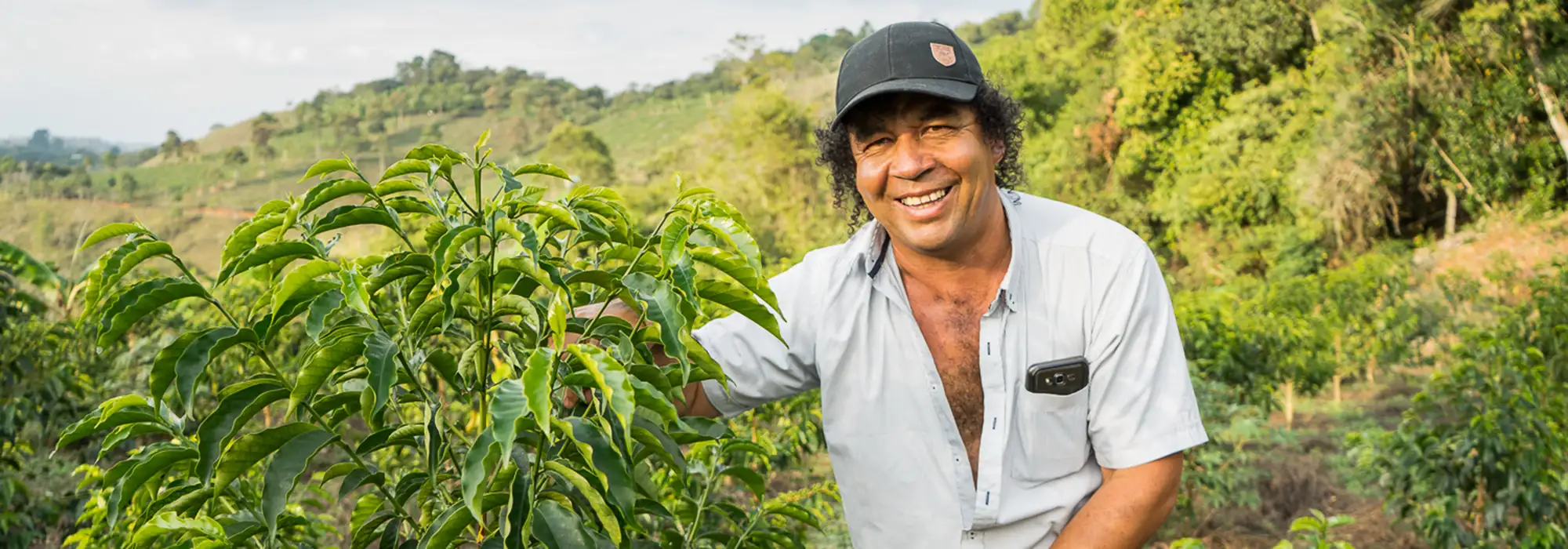
We started working with Elias Roa in 2012 and since then we have been working hard, every harvest, to improve the infrastructure at the farm as well as farming and processing practices. I first met Elias back in 2007 when I was traveling around Colombia with my friend and coffee exporter mr. Alejandro Renjifo. The aim of the trip was to find delicious coffees and potential farmers that I could work with to make sure we got a steady supply of tasty coffees from Colombia. While passing through the state of Huila I visited a small group of farmers in Acevedo that was lead by Elias. I remember we drank hot chocolate (!) and ate bread and cheese at his house and Elias gave me an impression of being a passionate and hard working farmer. Later that year I received a few samples from him but unfortunately his coffee was not meeting my quality requirements so nothing really came out of it.
Learn More About Finca Tamana
Transparency
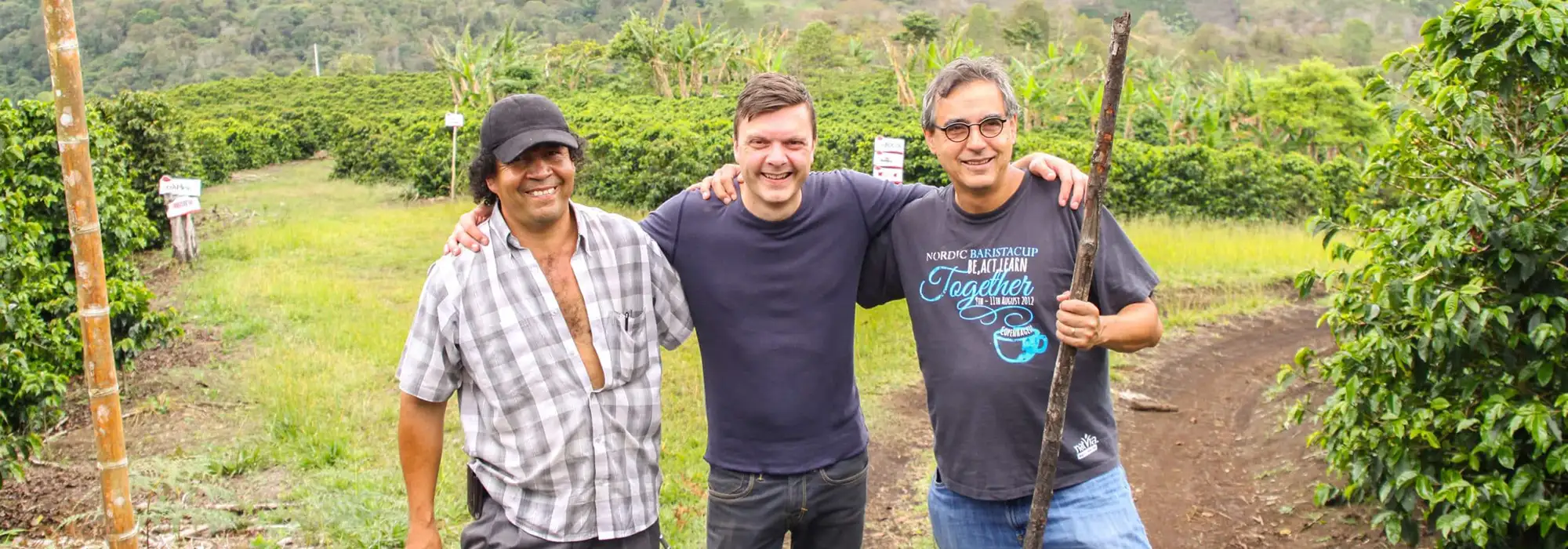
We buy coffee directly from Elias Roa, the farmer. Fairfield Trading, the exporter, provides milling and logistical service and the coffee is imported by ourselves directly to Norway.
Learn More About Transparency

